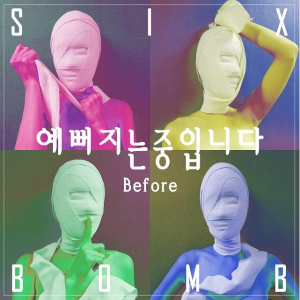 Last month, girl group Six Bomb released “Becoming Prettier (Before),” the first of their double-single concept about plastic surgery. The MV for this song follows the girls as they receive consultations before surgery, and prepare to undergo a variety of procedures.
Last month, girl group Six Bomb released “Becoming Prettier (Before),” the first of their double-single concept about plastic surgery. The MV for this song follows the girls as they receive consultations before surgery, and prepare to undergo a variety of procedures.
Now they’ve returned with the second single, “Becoming Prettier (After),” unveiling their new faces and…absolutely nothing else. It’s three minutes of the girls dancing in ice skater dresses and sneakers, while gloating about how they’ve become more beautiful. Devoid of any storyline, one might as well call it a dance performance video designed to focus on the members’ appearances.
A concept is meant to serve as the main idea behind a release’s sound, lyrics, and image, ideally tying the whole package together in a way that becomes memorable to viewers. But the choice to deploy plastic surgery as a concept here was not memorable so much as it was contentious. Because a majority of K-pop idols have undergone procedures, plastic surgery is generally accepted but not discussed, and rarely so brashly flaunted for the sake of making money.
For Six Bomb to defy social conventions by taking advantage of the elephant in the room, they needed to spin plastic surgery into a novel idea that challenged preexisting philosophies about beauty. They needed to tell a new narrative, and share a unique perspective that explained the reason for going so public with their new bodies, in the vein of Brown Eyed Girl’s infamous “Plastic Face” parody. Unfortunately this did not happen, and their basic MV was understood to be an attention-seeking gimmick that quickly became an object of ridicule.
Netizens largely looked down on the whole concept, deriding it as “desperate” and “lame.” Many have taken to criticizing the production quality of the release (low), even hypothesizing that Pacemaker Entertainment spent all 100 million KRW on the surgery and left none for the music video.
Traditional Western media outlets, eager to trot out another story about South Korea’s addiction to plastic surgery, also honed in on the new release. From BBC to Cosmopolitan, many websites gave Six Bomb the media attention K-pop groups jealously covet by momentarily placing them in an international spotlight, though focusing the topic on the country’s unnatural beauty standards rather than its incredibly competitive market for pop music.
 While Brown Eyed Girls was applauded for looking critically at the industry’s expectations of idols by making fun of themselves, exposing their personal pasts and their desire for success, Six Bomb’s “Becoming Prettier (After)” fails to share any sense of introspection with the viewer. They boast about the greatness of change without contemplating the reasons underlying them. And so in understanding plastic surgery as a spectacle, and focusing so heavily on the visuals of before and after, Six Bomb has only reinforced people’s one-dimensional feelings of distaste such procedures tend to evoke.
While Brown Eyed Girls was applauded for looking critically at the industry’s expectations of idols by making fun of themselves, exposing their personal pasts and their desire for success, Six Bomb’s “Becoming Prettier (After)” fails to share any sense of introspection with the viewer. They boast about the greatness of change without contemplating the reasons underlying them. And so in understanding plastic surgery as a spectacle, and focusing so heavily on the visuals of before and after, Six Bomb has only reinforced people’s one-dimensional feelings of distaste such procedures tend to evoke.
Yet these releases have emerged from an industry where plastic surgery is the norm. Often regarded as a rite-of-passage into adulthood, and occasionally compared (accurately or not) to the Western standard of getting braces, the variety of surgeries Koreans undergo every year are part of the rhythms of everyday life. And so in choosing to stick to the conventional narrative of physical transformation, “Becoming Prettier (After)” misses a rare chance to probe the emotions and stories surrounding South Korean people’s complex relationship to plastic surgery.
I think of a barista I worked with who constantly complained about how he had to convince his girlfriend her natural face was pretty enough. There was my college roommate who spent the two thousand dollars her father gave her for double eyelids on a trip to Hawaii. And my best friend’s parents who inevitably tell this story by the time we reach sam-cha:
During our first date, I asked him which part of me he liked best.
I answered her eyes. I thought her eyes were beautiful.
I told him that’s a bad answer, they’re the only part of me that are fake!
And then they always look at each other and laugh.

This is to say that so much of plastic surgery is not the physical before and after – but rather coming to terms with the decision to undergo or forgo a change in features, or knowing with how to address new differences in the aftermath. The medical treatment itself may be the easiest kind of imagery for a music video to illustrate, but they’re hardly the part of the story most worth discussing. Pale skin, narrow noses, and larger eyes are only the beginning of what can and should be said; there’s still so much untapped humor and sadness and guilt and joy on the issue for music to bring to light. Rather than the small, temporary brouhaha Six Bomb created online, the group could have generated more discussion through their personal experiences, and served as a landmark in changing our shallow perceptions of plastic surgery.
What the pageantry of Six Bomb in “Becoming Prettier” (Before and After) reveals is the terrifying heights to which companies will go to gain attention in today’s K-pop scene. I’m left with so many queasy feelings and questions: were the costs of the procedures added to each member’s debt? Were they really given the freedom to choose what kind of changes to undergo? And above all, how do the members feel now, after declaring their choices to the world?
It’s too bad I’ll never know. In the end, I’ve been asked to prioritize their faces and chests over their identities, and admire their bodies rather than their voices. While the transformation the members of Six Bomb underwent cuts well beneath the surface, the discussion on plastic surgery this release provokes is only skin-deep.
(Nate, BBC, Cosmopolitan, Youtube, Images via Pacemaker Entertainment)


